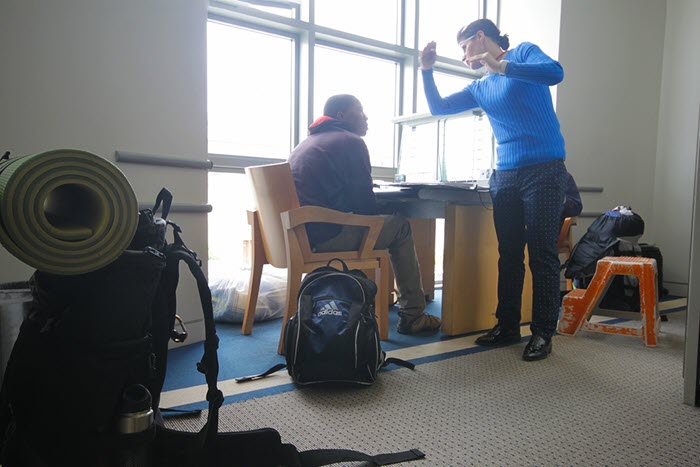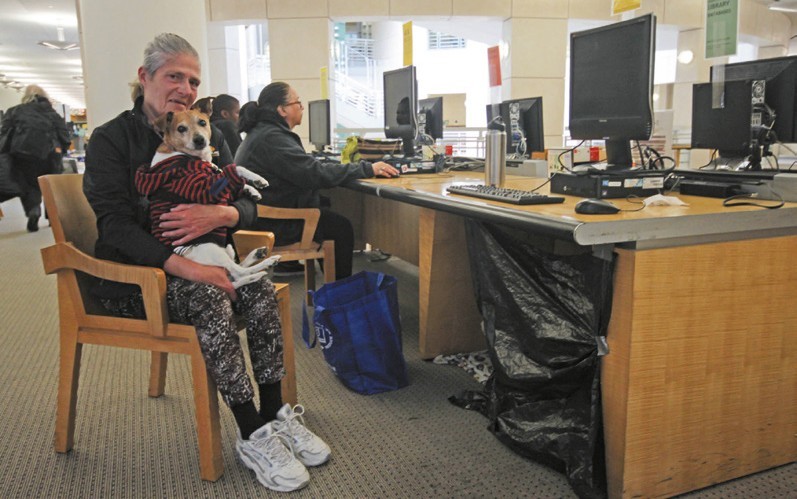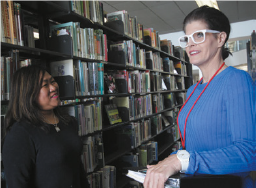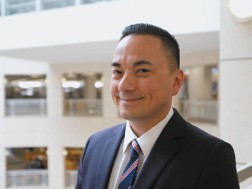Library as a Social Assistance Office
This article was originally published in Norwegian by Bok og Bibliotek (Book and Library, no. 4-2019, p. 48-51, and digitally on December 4, 2019). Written by Maria Pile Svåsand, it was translated into English by Bilingva. Republished with permission, and our thanks.

who is at the library applying for social assistance and housing.
With a determined stride and a big smile, Ida Abolins walks over to the writing desk at the window of the library in San Francisco and asks a young man bending over a pile of paper, "How are you doing?”
Overlooking the lavish City Hall (with a dome higher than the Congress building in Washington, DC) and the city where the UN Pact was signed in 1945, Shawn sits and completes the form for applying for social assistance. Around him sits pretty much everything he owns in sacks and bags.
There are many people like Shawn who visit the San Francisco Public Library who have a lot to carry, including large backpacks, bags and plastic bags with clothing and personal items. When you don't have housing in the city to live in, you have a lot to carry.
From the street to the library
Shawn let us take a picture but would rather not be interviewed. He is one of the 8,000 people in the city associated with the big red bridge and the cradle of the hippie movement. He is not one of those who are assumed to be homeless. He doesn't smell like sweat or urine, and he speaks without any sign of being intoxicated. There are many reasons people become homeless in a city with gentrification like San Francisco, where it is not enough to have a low-paying job, and where many people from the working class end up on the streets.
Abolins is 55 years old, and an upright and well-dressed woman. Her appearance doesn’t say anything about her history, but she was living in an SRO (single room occupancy hotel) less than a year ago and had been receiving mental health services. Less than one year has passed since she became sober. Prior to her receiving counseling services, she had years of difficulties and had been homeless for a long time. "I didn't have a bed for ten years," she tells me.
She is one of the staff at the library with the title HASA - Health and Security Associate. The ten HASA positions at the library are all filled by people who have previously lived on the street and chose the library as a place to be, to use the internet or to ask staff for assistance in finding a job or place to stay.

"I've always liked to read a lot, and the library has always been part of my life, but when I was experiencing homelessness, it became a safe haven. You feel dry and warm away from street problems and you can talk to the staff," she says.
"I now spend three hours a day here, and my job largely revolves around talking to people who may need help." For example, she tells Shawn, whom she helps with the application, where he can shower for free, where he can try to get a day job and who he should talk to at the social services office.
At almost every corner of the shelves, Abolins stops someone to asks how things are going. She knows the stories here, and people know her. "When you have been in similar situations yourself, you can give better advice, and it is easier to connect," says Abolins.
She also says that her job is rewarding. She is not ready for normal working life yet, but she is able to commit to three hours a day. It provides stability, a place to be and a sense of importance. "I see that the job I do matters, and at the same time, it means everything to me. I come here, Leah asks how I feel, and I am allowed to be who I am – with my own story," says Abolins.
A red thread
It has been ten years since the San Francisco Public Library became the first US library, perhaps in the world, to hire a social worker, and Leah Esguerra is still there. "I love my job," she says.
Nowadays, social worker positions at the libraries have become more common across the country, and Esguerra travels around the country telling people about the job she is doing.
"The most important thing we do is to be present, because many of them feel outside of the community. We then inform them about what we offer. Many of them have no idea where to apply for housing, work or get a shower. That way, we provide them with many opportunities that they did not know they had," she says.
It is easy to see that she is an important part of the library, as Esguerra is the type of person who knows the name of all those she has met and remembers details from the previous time she met them. Like their dog was sick or they had a new niece. She has even started a number of projects based on the needs she sees in the library, such as a "homeroom" where you can watch movies, eat snacks, knit, talk and generally just be in a room that feels like the home you don't have.
It was Esguerra who started the HASA program, and many of those who have worked as HASAs have now secured "real" jobs elsewhere in the city.
In the library, Esguerra's knowledge of library visitors and the social problems of the city are always useful. "I offer consultation for almost all projects that are carried out here, from single events to the construction of the new youth department. Looking at the needs of individuals creates a better and more targeted project," she says.

around bookshelves and offering help for those who need it. "But I never
ask anyone if they are homeless. They are the ones who choose to tell me
if they want to," says Esguerra.
For many, the library is the only place they can go to benefit from its many offerings and to be indoors. At the mall a few blocks away, for example, homeless people are kicked out at the door, and in cafes you have to buy something to get inside or use the restroom. "We are here for anyone who needs us, regardless of their background, income or housing situation. And we welcome everyone the same way; perhaps we are alone in doing so," says Esguerra.
Most of those we talk to in the library have the street as their place of residence. The places they go to otherwise are places with offerings for people experiencing homelessness, such as temporary shelters, churches, and food pantries – places where you become very aware that you are at the bottom of the ranking ladder in society. The library is the only place where they have exactly the same offerings as everyone else and are treated equally.
But they also get more at the library. Esguerra and HASA offer guidance and provide a large network for people to connect with. Esguerra has ensured that 200 people have been given a place to live, and the library’s offerings to those experiencing homelessness has expanded significantly. "We collaborate with other agencies. Once a week, a bus with free shower facilities comes here, and we have a market where organizations and various public offices come to announce what offerings are available," she says.

library is unique in its role as a place for absolutely everyone.
Inclusive
"Everyone Is Welcome" says a poster on the office door of City Librarian Michael Lambert, in 6 different languages. The poster also hangs on all the other office doors in the corridor, and on many other doors in the large 6-floor building in downtown San Francisco.
They hang in places where everyone can see. The posters are in many languages, English, Spanish, Chinese and more. There are also large collections of books in other languages, a state-of-the-art youth department with maker space and game development, and events for everything from meditation to language cafes and coding.
At desks and tables there is a mix of people of all ages and all colors and with clothing and appearances that reflect all the steps of the socio-economic ladder.
In the middle of the community
In 2018, San Francisco Public Library was named the Library of the Year in the United States, among 116,000 public libraries in the country. "It is essentially our focus on diversity and inclusion that gave us that title," says City Librarian Michael Lambert.
From the top drawer of his desk in the big office, he shows me Narcan. The nasal spray that can stop a heroin overdose. "We have this available on all floors, and the staff must know how to use it. Unfortunately, there have been situations where they needed that knowledge," he says.
It's just one of the signs that this library is in the middle of an area with social challenges. The opioid crisis in the US has been around for a while, the housing crisis in San Francisco has been longer, and the large number of people experiencing homelessness has been a problem on the political agenda since the 70s. It has not improved.
The library reflects the local community. The main branch of the San Francisco Library is in the middle of the downtown area, which has a high percentage of people experiencing homelessness, even though after a few blocks this changes. There aren't many people with suits and ties around here. On the stairs in front of the library, there is a man sleeping, and along the wall you see people who obviously do not have a daily access to place where they can sleep or shower. "We offer a safe place, from life outside, from the weather and also from the stigma associated with homelessness. Here, everyone is equal," Lambert says.
The library takes seriously the social problems that characterize San Francisco and the visitors to libraries.
But you always hear people saying that there are many homeless people here, and if you look at the online reviews of the library, not everyone seems equally satisfied. How do you respond to this criticism?
"I think that most people in San Francisco are open and inclusive, and we're the part of the city administration that gets the best feedback from the public. On average, we score about 4.5 out of 5 points on our offerings, and that's what we’re focusing on. We are here for everyone, and take into account who our visitors are when prioritizing our resources and when planning projects and activities," says Lambert.
A trolley for rescue
Jeanie Austin feels that what prison inmates appreciate the most is the ability to choose something for themselves.
The San Francisco Library has created a dedicated department associated with the city's prisons. Two employees travel around five different prisons each week with library trollies and come up with offerings that are limited for that target group. "For many, we are the only people they talk to who come from outside the prison. And we give them the only opportunity to choose something for themselves," says librarian Jeanie Austin.
In prison, inmates do not have a choice about when to get up, when to go to bed, what to eat and what to do. It is not even possible to choose which TV channel to watch. That’s why a purple library trolley with 200 books to choose from is a welcomed offer. "We get them the books they want. A lot of them read the books of the crime writer Peter Robinson, and we probably lend more urban fiction than any other branches," says Austin.
The county jails act like custodial prisons in Norway. Well over half of those inside are not sentenced yet but are awaiting trials and have no bail money. They can’t access the internet and have limited resources to use. "Some of them have told me that they would have not had survived their prison sentence without us," shares Austin.
In addition to the books, the library's prison service provides other guidance. One offering is that inmates can send letters with requests for information from the internet. The librarians can then find the requested information and print it for them. Inmates can send two letters per month.
"We have copied this program from New York, which has had great success," says Austin. People ask for many things, from specific articles to conspiracy theories, and to information about issues surrounding their own case. Many ask how they can start their own business, especially cannabis businesses, as those who were formerly employed often find it difficult to get a job. But there are those who ask for simpler things, like lyrics, for example. "We get letters from people who say that they sit in isolation for 23 hours in solitary confinement, and that they need song lyrics to help them not lose their courage and mind. It is rewarding to be able to help people that way."
Austin recently completed a PhD on library work in youth prisons and is very interested in the social services aspects of being a librarian. "There is a big debate now in the library environment, on how much responsibility we really have for the social needs of our patrons. The way I see it is that we can't meet the cultural needs of our users until they have had their social needs met. Only then can we focus on other things."
